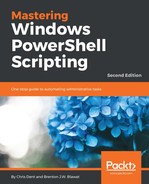Base64 has 64 possible values between 0 and 63. Each value (an index) has a character associated with it. The characters, in order, are A to Z, then a to z, then 0 to 9, and finally + and /. The = character is used as a padding character.
The base64 index 9 is the character J, index 56 is the character 4, and so on. We can have PowerShell make this array for us:
[char[]]$base64Characters = [int][char]'A'..[int][char]'Z' +
[int][char]'a'..[int][char]'z' +
[int][char]'0'..[int][char]'9'
$base64Characters += '+', '/'
The following process is used to convert the ASCII string He to base64.
Convert the characters to bytes:
|
ASCII |
H |
e |
|
Code |
72 |
101 |
PowerShell can convert characters to ASCII values using the following:
[int][char]'H' [int][char]'e'
To illustrate the process, the two values are converted into bits:
01001000 01100101
The Convert class can perform this step in PowerShell:
[Convert]::ToString([int][char]'H', 2).PadLeft(8, '0') [Convert]::ToString([int][char]'e', 2).PadLeft(8, '0')
Base64 uses a six-bit boundary (instead of eight), that gives three distinct indexes:
010010 = 2 + 16 = 18 000110 = 2 + 4 = 6 010100 = 4 + 16 = 20 # Padded on the right to make 6 bits
These indexes have base64 characters associated with them, S, G, and U in turn.
The base64 string now needs padding until it fits into a sequence of bytes (is divisible by 8). The entire process, including the padding, is shown following:

The process can be implemented in PowerShell, even if it is slower than Convert.ToBase64String. In this example, the bits are treated as a string:
function ConvertTo-Base64 {
param(
[string]$String
)
# Generate the base64 character set
[char[]]$base64Characters = [int][char]'A'..[int][char]'Z' +
[int][char]'a'..[int][char]'z' +
[int][char]'0'..[int][char]'9'
$base64Characters += '+', '/'
[String]$bits = $string.ToCharArray() | ForEach-Object {
[Convert]::ToString([int][char]$_, 2).PadLeft(8, '0')
}
$bits = $bits -replace ' '
$base64String = ''
# Get the 6-bit fragments and convert each to an index
for ($i = 0; $i -lt $bits.Length; $i += 6) {
# Get the bits for the index
if ($bits.Length - $i -lt 6) {
# If fewer than 6 characters remain, get all of them
$indexBits = $bits.Substring($i, $bits.Length - $i)
} else {
# Get 6 characters
$indexBits = $bits.Substring($i, 6)
}
# Pad the right so the 6-bit value is correctly padded
# then pad the left so it can be converted to a byte
$indexBits = $indexBits.PadRight(6, '0').PadLeft(8, '0')
# Convert the bit string to a byte
$index = [Convert]::ToByte($indexBits, 2)
# Get the base64 character
$base64String += $base64Characters[$index]
}
# Pad the base64 string until length is divisible by 6 and 8
$length = $bits.Length
while ($length % 8 -ne 0 -or $length % 6 -ne 0) {
if ($length % 6 -eq 0) {
# Add the padding character
$base64String += '='
}
$length++
}
return $base64String
}
